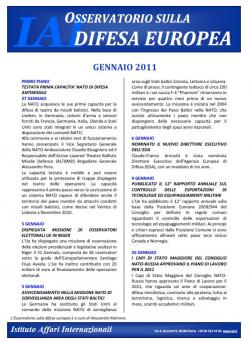Observatory on European defence, November 2002

November 2002
Greek, French, German and English Proposal to the Convention - European Defence
The draft document on defence presented by the Convention on the future of the Union has catalysed the initial reactions of some European governments. A Greek proposal was presented on 18 November; the document recommends the adoption of a mutual assistance clause between member states, the use of the qualified majority vote in CFSP decisions and reinforced cooperation in ESDP matters, as well as the institution of a permanent, formal EU “Defence Council”. On 22 November, right after the NATO Prague Summit, a joint French-German document was presented. Like the Greek one, it calls for the adoption of reinforced cooperation within ESDP (including armament policies, industrial strategies and the research and development sector) and the inclusion in the Treaties of a mutual solidarity provision, as well as the creation of a European Armaments Agency and determination in facing the threat posed by international terrorism. The English proposal of 29 November seems to lead in a different direction; the focus is on guaranteeing the primacy of NATO in the collective defence realm and avoiding possible de-coupling from the USA and duplications with the Atlantic Alliance. Moreover, the English government is in favour of establishing an agency for improving military capabilities, but in an intergovernmental, not a community framework .
The discussion on the future of ESDP has entered a crucial phase and the first differences between European countries are beginning to emerge, in particular on the willingness to increase EU involvement in defence policies. The relation with the USA has revealed itself as the central argument of potential disagreement. The recent developments in the NATO framework and in particular the decision to create a NATO response force are generating a dilemma for EU governments concerning the compatibility and sustainability of national policies in the two multilateral organisations. A difficult equilibrium will have to be found between different national needs and sensibilities, without threatening the development of a European defence policy, much needed by the European countries.
19 November 2002
General Affairs Council and EU Defence Ministers - Military Capabilities
The General Affairs Council with the participation of Defence Ministers was held in Brussels. Ministers discussed the advancement of the study groups on the development of the military capability for the European Reaction Force; their works shell end by 1 March 2003 and a Capability Conference will take place on 1 May 2003. The ECAP (European Capability Action Plan) panels are already delivering initial results in terms of additional capabilities, but there is still a need for an optimisation of the ever scarcer resources. The PSC (Political and Security Committee) received a mandate to study the feasibility of a high-readiness rapid response force that could integrate the Reaction Force that will be declared operational in 2003.
21 November 2002
NATO Summit in Prague - Relations with EU
The NATO Summit of Heads of State and Government held in Prague has given strong impetus to adapt the Alliance to the new strategic context. NATO will enlarge to 7 new members (Estonia, Latvia, Lithuania, Slovak Republic, Slovenia, Romania and Bulgaria) and will reorganise the present command structures. Moreover, the governments decided to approve the American proposal to develop the NATO Response Force (NRF), a high readiness force of 21,000 troops for high-intensity operations everywhere, the fight against terrorism included. The political determination to develop new capabilities to fill the identified gaps (so-called Prague Capabilities Commitment, PCC) was also expressed. A definitive agreement on EU access to NATO capabilities (so-called “Berlin +” arrangement) was not reached. Turkey proposed a joint EU-NATO Exercise in 2003.
The main spillover from the Prague Summit onto the European Security and Defence Policy concerns two short- and medium-term aspects: the creation of a new NATO force and enlargement. The enlargement process will determine a further differentiation in the membership of the two organisations, which is potentially dangerous notwithstanding the almost contemporary (but asymmetrical) enlargement of the EU (Romania and Bulgaria will not become part of the EU for some years, while Cyprus and Malta will soon be members). But the most interesting issue is the development of the NATO force; the governments have guaranteed that it will be complementary to and compatible with the EU Rapid Reaction Force, but there are some doubts about its real impact, because the two forces draw on the same set of already scarce resources. Moreover, the inclusion of some missions in the NATO mandate, which exclude de facto the possible involvement of the European Force in high- intensity missions, puts strong limitations on the Petersberg tasks and the ambitions emerging in the framework of the Convention on the future of Europe. It is difficult to argue that the NRF does not represent a new obstacle to stable and reciprocally autonomous relations between NATO and the EU. On the other hand, the position of certain countries, which raise different objections depending on the framework in which the problem is posed, seems more and more difficult to sustain. Once more, one of the key factors is the transatlantic relation, the future of which is increasingly unpredictable.
-
Details
Roma, Istituto affari internazionali, 2002 -
Issue
02/11


